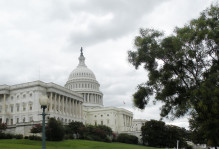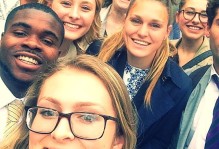An Officer, A British Gentlemen…and an Expert on Transnational Crime!
Following Account of LTC Murphy provided by Guest Blogger: Nicole Wright
Following Account of Douglas Farah provided by Guest Blogger: Ben Kenzer
Following Account of British Embassy site visit provided by Guest Blogger: Alexandria Foster
May 16, 2013
On Thursday morning, the National Security Institute welcomed Lieutenant Colonel Michael Murphy. He spoke personally (not on behalf of the Department of Defense) about his unique experiences in Afghanistan, walking us through some of the challenges facing counterinsurgency efforts – including the massive amounts of corruption within the Afghani government, leading to a disconnect between the administration and the people. He emphasized that the Afghani government must defeat terrorist insurgencies by building trust amongst its citizens; and the United States forces should act more as advisors, rather than facilitators, to enhance Afghanistan’s independence.
LTC Murphy was also adamant that U.S. forces be culturally aware in order to be more effective counterparts. Speaking the language, being familiar with the micro-level narratives, and generally connecting with citizens were all crucial to his success in building trust between local Afghani citizens and the U.S. military. Murphy believes that if we want to combat extremist rhetoric – and thus, terrorist organizations – the U.S. armed forces must make the effort to portray themselves as a positive presence with commendable values. LTC Murphy was extremely easygoing and personable – I had no trouble imagining him on the ground in Afghanistan, conversing with the locals and building personal relations. Once again, our speaker proved that engaging in serious business does not mean you have to be an overtly-serious person: LTC Murphy cracked jokes periodically throughout the discussion and inquired about what interests us, personally. He obviously cares about understanding others in an in-depth way, making him an excellent liaison between Americans and Afghanis, as well as an outstanding lecturer.
After the Murphy lecture, we had a while before our next speaker, so we could explore the surrounding area of DuPont Circle. Professor Floyd suggested we check out Kramerbooks, an independent bookstore not too far from the William & Mary Washington Office. My roommate, Kelsey, and I decided to embark on this adventure and were very glad to have found a gem of a place – filled with every genre of book possible, with a heavy concentration in political science and history. In addition to millions of books, the store had a cute little coffee shop: a must for college kids. Although we had to get going, Kelsey and I decided we would definitely be frequenting this spot in the future.
Hurriedly returning from Kramerbooks, Kelsey and I joined a discussion with Mr. Douglas Farah, president of IBI Consulting and author of Merchant of Death – a book that discusses the shady arms dealer, Vicktor Bout, and the underground world of international arms trading. Throughout his talk, Mr. Farah kept us riveted with stories of his adventures in West Africa and Latin America, describing meetings with drug lords, Drug Enforcement Administration (DEA) agents, and everyone in-between. He depicted a world in chaos, where the criminal underworld has carved out vast swaths of territory and continued U.S. apathy risks dragging the world into further violence and uncertainty. However, there is some hope: Mr. Farah implied that with a proper re-configuring of the drug war, and with new enforcement and tracking mechanisms, those who challenge U.S. interests may be defeated.
The British Embassy was up next; and strangely enough, as we were traveling via Metrobus, we ran into Peter Apps, an internationally known journalist! He was heading to a different meeting at the Embassy and had agreed to meet with us only hours before. Once again, we were shown the incredibly connective nature of Washington, D.C. – which is almost eerie…
At the Embassy, we discussed the relevance of security policies other than our own. The United Kingdom is closely allied with the United States, and this was made very evident in our visit. Both countries share many of the same interests and values, and the structure of the Embassy closely aligns with that of the United States’ embassies around the world. Though the U.K. is a small country, it seeks to “punch above its weight” in order to remain competitive in the global economy and to assert itself as a significant global power. Its national security strategy focuses on countering many of the same threats that the United States has focused on recently, including but not limited to cyber war, conventional threats, and terrorism – seeking to resolve these issues in many of the same ways.
Therefore, it was another successful, yet busy, day. It is incredible how much we’re learning and doing within such a small duration; and frankly, I have no idea how time allows for us to experience so much each day. I feel challenged, in a good way, as the end of each session brings with it a more enlightened perspective on my part. My brain is definitely getting the workout of its life; but the results will be well worth the effort.



No comments.
Comments are currently closed. Comments are closed on all posts older than one year, and for those in our archive.